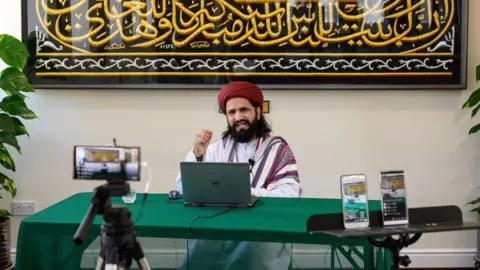Coronavirus: Muslim Council urges people to avoid communal Eid celebrations
 AFP
AFPMuslims in the UK have been urged to celebrate the Islamic festival of Eid at home under lockdown this weekend.
Traditionally the festival at the end of the fasting month of Ramadan is marked with communal prayers in mosques, visits to friends and family.
But the Muslim Council of Britain says people should celebrate virtually due to social-distancing measures brought in during the coronavirus pandemic.
Guidelines for those celebrating have been drawn up by the council.
The special Eid al-Fitr prayers are typically among the best attended of the year, and people also mark the occasion by holding parties.
However, due to the pandemic, mosques have been closed for nine weeks.
Miqdaad Versi, head of public affairs at the MCB - an umbrella organisation of various UK Muslim bodies - says there was "real sadness" at the prospect of not being able to celebrate communally.
"Normally Muslims will be at the mosque, mosques will be thronging with people from the morning and households will not be just be [full] of individuals, but families, extended families and friends all coming together," he said.
"So from a religious perspective, that's really difficult. Every single year people get dressed up and go to the mosque and take part in this really important, obligatory for some, part of the faith. And that just won't be possible."
Situation 'unthinkable'
Qari Muhammad Asim, senior imam at the Makkah Masjid in Leeds and chair of the Mosques and Imams National Advisory Board, said it was the first time in British Muslim history that there will no Eid prayer.
"This is something that was unthinkable six months ago, but today unthinkable has become reality," he said.
"The Eid prayer is something that people look forward to all day long," he said.
"This is extremely challenging and distressing for us. We have had to make a lot of spiritual sacrifices during Ramadan and that will continue on the day of celebration."
Ramadan, the Islamic holy month, is a special time for nearly two billion Muslims all over the world.
In a normal year, it is a time of communal prayer and of daytime fasting from all food and drink. It is also accompanied by night-time feasting and acts of generosity and charity as Muslims reaffirm their faith in God.
Sajjad Amin, from the Khizra Mosque in Cheetham Hill, north Manchester, said that while the prospect of Eid al-Fitr under lockdown "will be difficult, it was probably harder not going to the mosque during Ramadan".
He said: "It is something we have all done since we were children - whether going to the mosque during the evening to break the fast, or for the regular prayers. All that has been taken away from us.
"So although it is a big disappointment for Eid to be under lockdown, it is something we have gone through with Ramadan. It is difficult but we're kind of used to it."
The MCB has issued separate guidance for Muslims living in England, Northern Ireland, Scotland and Wales reflecting the different government advice in each nation. But across Britain, Muslims have been asked to celebrate virtually and share the traditional gifts by posting them in advance.
MCB secretary general, Harun Khan, said: "Whilst Eid away from the mosques and from our loved ones is unprecedented and will be a source of great sadness in communities across the country, Muslim communities will adapt and find the best way to still celebrate this holy day whilst aligning to the latest guidance."
At the beginning of Ramadan, Health Secretary Matt Hancock thanked the British Muslim community for suspending congregational worship and abiding by the lockdown.
